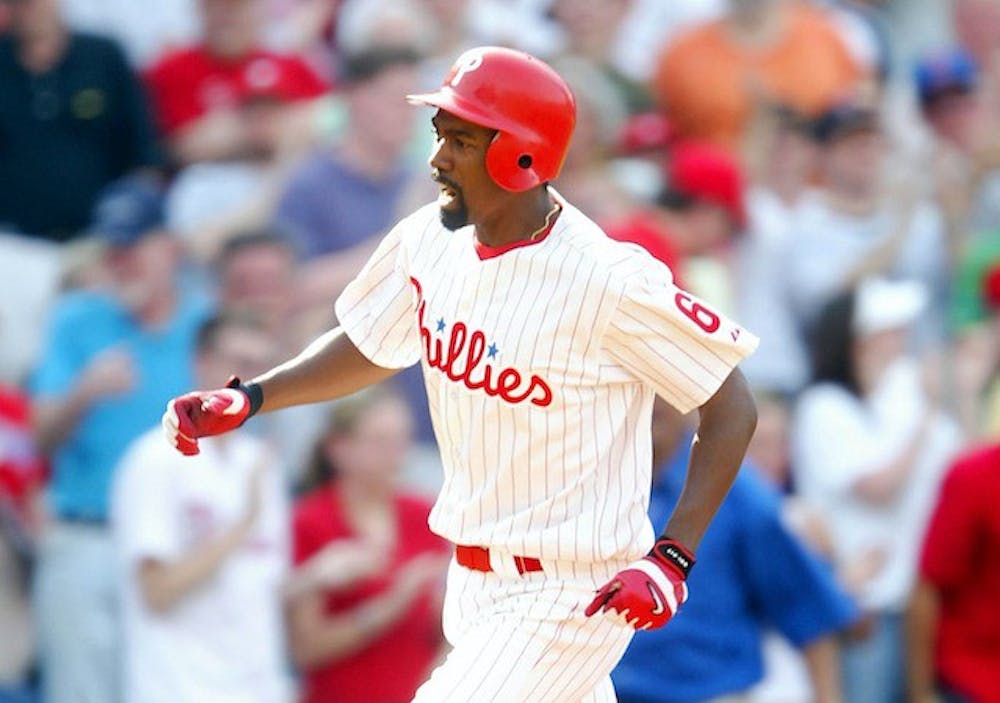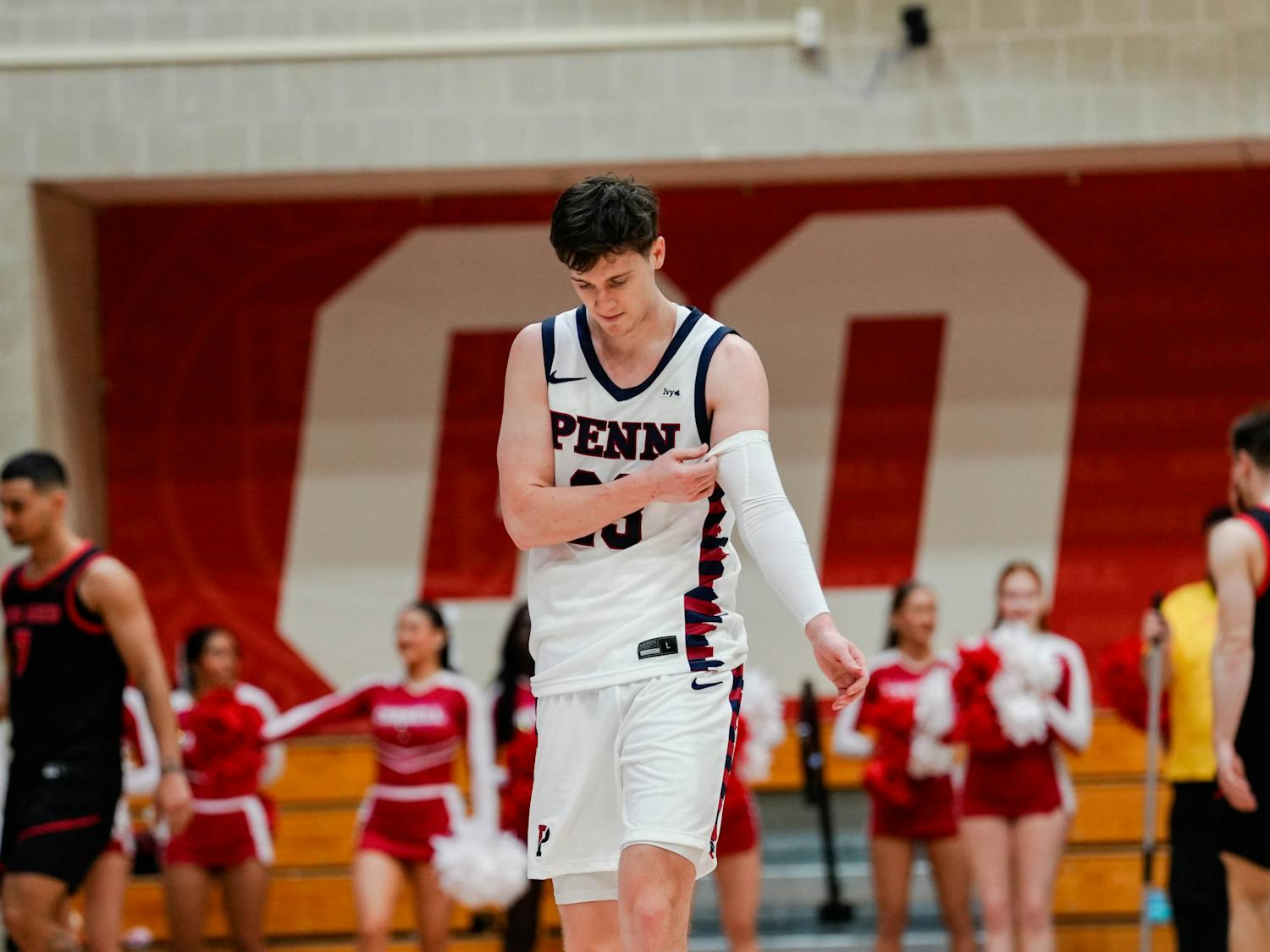As one of the most respected voices in baseball today, former MLB player and Penn alumnus Doug Glanville provides valuable player perspective on some of the largest issues in the game.
Glanville grew up in Teaneck, N.J. during the 1970s to his parents, a math teacher and a psychiatrist, who emphasized two things: education and equality. Teaneck had voluntarily desegregated in the early 1960s, and Glanville enjoyed a childhood with early exposure to diversity, especially on the sports field.
“When you have a town that is so diverse and the players look like the United Nations,” Glanville said, “[you learn] two good lessons — unity and equity.”
Glanville excelled both on the field and in the classroom. In high school, he attended Princeton’s summer baseball program, which introduced him to the prospect of playing baseball at an Ivy League school.
Glanville was recruited by both Penn and Princeton, among many other schools. Longtime Penn baseball and soccer coach Bob Seddon recalled that he, along with longtime assistant Bill Wagner, stayed in New York overnight following a game at Columbia in the 1986 season, a rare occurrence in recruiting. Nonetheless, the following morning, the coaching pair drove to Teaneck to meet Glanville and his parents.
For Glanville, a top-level education was crucial. With the standard of academics that an Ivy League education offered and an adjusted playing schedule considerate of class commitments, Glanville's decision to play college ball at an Ivy League school came easy. From there, it was just a matter of choosing the Tigers or the Quakers.
According to Seddon, Glanville didn’t have the best experience at the Princeton camp. With Princeton’s lack of engineering program and the appeal of big-city Philadelphia, Glanville chose Penn instead.
Seddon added that longtime Princeton baseball coach Tom O'Connell was especially upset about Glanville's commitment to Penn. O'Connell assumed that Glanville’s high school camp attendance ensured he would play collegiate baseball with the Tigers. This, combined with losing his expected star player to his bitter rival, really pushed O'Connell over the edge, with Glanville describing the conversation he had with O’Connell about playing at Penn as “horrific.”
Glanville played in college from 1989 to 1991, joining the Quakers in the middle of a three-year streak of Eastern Intercollegiate Baseball League championships. He didn’t begin his career as a starter, and it wasn’t until coach Seddon benched a few older players for breaking curfew that he got his chance to play. Given the option by Seddon, Glanville chose to fill in that day in center field and was the starting center fielder for the University of Pennsylvania for the next two and a half years.
Glanville’s first two seasons were some of the most successful in Penn baseball history, with the Quakers winning the Eastern Intercollegiate Baseball League (the precursor to the Ivy League Baseball League) in both 1989 and 1990. Glanville hit .328 and .338 in those seasons and was the team's starting centerfielder. 1989 was especially successful for the Red and Blue, as they won 18 straight, were nationally ranked, and even beat a nationally ranked Illinois team in the NCAA Tournament.
Glanville recalled one game against Brown during that season where it was so snowy and cold that Seddon saw a light during a play and came out to argue that the game should be canceled due to lightning. It turned out that the flash was just a photographer's flash, but it was so dark that it resembled lightning. Seddon also recalled one game against Navy in which Glanville hit a home run all the way out of the park.
Despite his great athletic success, Glanville remained focused on an engineering career post-college.
“I always wanted a career in the majors, but was pragmatic about it,” he said.
That all changed following the 1990 season, when Glanville was invited to Massachusetts to join the top college players in the nation in the Cape Cod Baseball League in playing baseball for the summer. Surrounded by future major league players and several MLB scouts, he won the Outstanding Pro Prospect award.
“The moment I had the validation that I could hang with those guys [from top baseball programs] and the scouts, everything else started falling in line after that,” he said.
Even though Penn finished ninth in the league in 1991, Glanville hit .414 and solidified himself as one of the top MLB prospects heading into the 1991 MLB draft. Glanville opted to go to the draft and skip his senior year, a move that paid off when he was drafted 12th overall by the Chicago Cubs, ahead of future MLB all-stars Manny Ramirez and Shawn Greene.
Despite his status as a first-round pick, Glanville had to play in every level of the minors before he got his shot in the big leagues. For Glanville, playing in the minors was a challenging adjustment from his college career. The day in, day out, seemingly endless grind forced him to focus on his dream. Despite the difficulty of it all, he came out with a very important lesson.
“It is easy to thank your supporters, but it is also important to thank your detractors,” he said.
Finally, in 1996, he was called up for the final 50 games for the Cubs. As a huge baseball fan who played Strat-O-Matic growing up, Glanville was finally living the dream.
“[Playing in the Majors] lived up to the hype. Going in, putting on the uniform, not believing this was your name in the lineup, seeing your name in the box score the next day,” he said.
Glanville, whose career spanned from 1997-2004 with three different teams, had his most successful season in 1999. He hit .325 and stole 34 bases for the Phillies, who he had signed with the year prior.
Glanville’s career began amid the MLB's struggle following a player strike and a canceled 1994 season. The great home run chase of 1998, led by Mark McGwire and Sammy Sosa, helped reinvigorate the game. In the following few years, baseball saw a home run explosion like never before, successfully reengaging many of the fans it had lost after 1994.
This all came crashing down in 2007 with the release of the Mitchell Report. A 409-page report written by George Mitchell, a former United States Senator, named 89 players for illegally using performance-enhancing drugs to gain an edge. For Glanville, after being raised with the value of equality, it was frustrating to sit and watch the media poorly cover the report.
“I found myself underwhelmed by the commentary. It wasn’t that they weren’t great writers, it was just that it was all about name-naming and name-calling. There wasn’t a player perspective. I kind of waited and then said ‘maybe I need to write it,’” he said.
Glanville decided to write a piece and pitch it to ESPN, where it was ultimately published. It was met with positive reception, and Glanville was encouraged by Alan Schwarz, a New York Times columnist and Penn alumnus, to pitch a weekly column to the New York Times. Glanville flew out to New York, and before even finishing the pitch, was given a weekly column.
Writing the column helped Glanville focus on a career post-baseball and kept him connected to his father, a lover of writing and poetry.
After a few years of writing his column, he managed a book deal and wrote “The Game From Where I Stand,” a book about his career.
Following this, ESPN began recruiting Glanville to work at the network, and, despite wanting to remain a writer, he eventually relented and decided to interview as an analyst. He was hired to his position where he's been for 12 years.
Some of Glanville’s most prolific work in the past decade has been about cheating in sports. From a scathing 2020 New York Times piece on the Astros cheating scandal to a recent article for ESPN on why he is fine with Barry Bonds not being elected to the MLB Hall of Fame, Glanville has continued his stance on the importance of equity and unity in sports from his current position in the media.
As one of the most respected voices in baseball today, Glanville credits his media success to both his childhood and his time at Penn. Baseball will continue to move forward and grapple with questions such as youth engagement and the collective bargaining agreement, and Glanville’s voice will lead the many modes of commentary in the sport.









